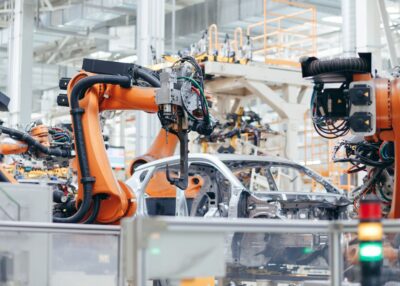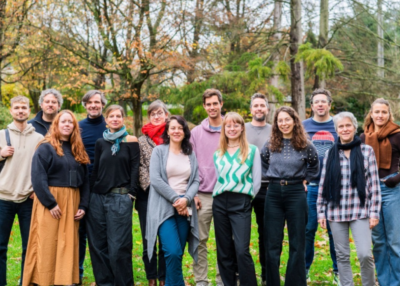
COVID-19: Brussels, on the cutting edge of emergency medical equipment
In just a few months, a number of Brussels companies have rivalled each other with their boldness and inventiveness to meet the many challenges created by the COVID-19 crisis. Thanks to its international network and lifetech.brussels cluster, which is dedicated to medical technology, hub.brussels has been able to assist the healthcare sector with the development of suitable protective equipment.
Of course, e-health and medical devices were already priority sectors for the Brussels Region before the coronavirus arrived. With the health crisis, things took on another dimension: the European capital had to rapidly find a way to provide its hospitals, home care centres, nursing homes, companies, shops, public institutions and private individuals with the protective equipment they needed to continue conducting business.
But that was without counting the resilience of its entrepreneurial ecosystem, as Isabelle Laverge, Director of the Internationalization Support Department at hub.brussels, explains:
Thanks to its capacity for innovation and resilience, both in terms of companies and public institutions, the Brussels Region continues to reinvent itself. Rather than giving up in the face of the crisis, it sees this as an opportunity to bounce back, even stronger and even further.
They brought innovative solutions to the health crisis
MoveUP, an app for remote COVID-19 detection
MoveUP was started to provide people who underwent a hip or knee operation with complete interactive follow-up from their doctors, before and after their operation.
Two engineers and an orthopaedic surgeon are behind the concept. They were looking for a solution to the lack of post-operation follow-up.
MoveUP now enables doctors to check on their patients daily using a full dashboard. Patients can count on regular follow-up through the app.
Faced with COVID-19, MoveUP adapted by providing healthcare professionals with a remote solution for following people suspected of having the virus, who were diagnosed with it or who are recovering from it.
The start-up helps ensure the safety of generalist doctors, monitor the spread of the virus in the population and provide physical therapists who can no longer treat their patients the option of following their recovery remotely.
Having identified the potential of this solution, hub.brussels, through NCP Brussels, accompanied MoveUP in their submission to the European Innovation Council, where the start-up obtained 2.7 million euros in the first half of 2020 to accelerate their R&D and international expansion.
Spentys, 3D printing for emergency medical equipment
Spentys offers a clinically validated digitisation, modelling and 3D printing platform for producing high-quality braces and splints at a lower cost.
They are recyclable, waterproof, light, adaptable, comfortable, aerated, and, most of all, customised. The company works with orthotists, physical therapists and orthopaedists.
When the coronavirus crisis began, the company changed its production and target market to help hospitals in need of replacement parts for their ventilators. Braces were set aside to make room for valves and plexiglass protection masks in the company’s 3D printers.
Spentys also designed a hook-shaped device for opening and closing doors without having to touch the handles. Several hundred units of this tool have already been sold.
Kaspard, for detecting falls in hospitals
Thanks to a small, contactless, unobtrusive device installed in the ceiling, Kaspard detects falls and abnormally long bed absences and notifies healthcare personnel with a real-time alarm. Nurses are informed of falls without having to enter every bedroom.
The solution has been even more useful during the health crisis: Kaspard has been a major help to healthcare staff in hospitals and nursing homes who were overwhelmed by the daily management of the pandemic in their establishments.
The solution has helped optimise night rounds and made it possible to concentrate on emergencies while staying informed in real-time.
Today, the scale-up is able to think big, thanks to the €500,000 invested by ScaleFund II, an investment fund that supports start-ups. The funding should enable it to industrialise its production and speed up its international development.
NB: MoveUP, Spentys and Kaspard are alumni of hub.brussels’ MedTech Accelerator in 2016, 2017 and 2018 respectively.
Brussels projects rewarded at the EU level
From 24 to 26 April 2020, the European Commission, in close cooperation with the member states of the European Union, held a pan-European hackathon to bring together civil society, innovators, partners and buyers from across Europe to develop innovative solutions to overcome the challenges of the COVID-19 pandemic.
More than 20,900 EU citizens took part in the challenge. 2,150 solutions were submitted in the fields of healthcare, business continuity, social cohesion and policy, remote work, education and digital financing. Belgium actively participated in the war effort, with 630 participants. Nine Belgian projects were selected, including 2 projects co-led by Brussels residents and supported by hub.brussels.
Borderx, to fight COVID-19 without borders
Created during the EUvsVirus hackathon, Borderx is a project led by a team of 5 engineers from Germany, Italy and Belgium (Brussels).
- The basic premise
The closure of the borders is a danger both for EU principles and for citizens’ health and safety.
- The solution
Borderx offers a system in which carriers can declare the transport of priority goods and the borders they will be crossing. The solution reduces the waiting time at the border by ensuring that critical goods can cross in time to save lives. It can be deployed at very short notice and can be shut down in the event of new waves of infection or other crises.
Unmanned Life: drones to disinfect public spaces
Unmanned Life brings together a team of more than 17 full-time employees from over 9 countries. Together, they have over 100 years of combined experience in technology, management and business in the largest companies in the world.
- The basic premise
Public spaces must be disinfected continuously to contain the spread of the virus. Currently, most disinfection tasks are carried out manually by disinfection staff. The manual disinfection process is extremely long and imprecise and it exposes workers to the virus.
- The solution
Unmanned Life is a pan-European pioneer in AI-driven autonomy technology located in the United Kingdom, Belgium, Spain, Estonia, San Francisco and, soon, Singapore.
Although the software platform, already in existence, is able to treat multiple COVID-19 use cases, as part of the hackathon, the team proposed the deployment of an autonomous swarm of disinfection drones controlled by the Autonomy-as-a-Service AI software platform.
Deployed remotely by mobile deployment centres (vans) near to the operations site, the drones can be used to repeatedly, quickly, and cost-effectively disinfect large areas in a city with precision, both indoors and outdoors.
Brussels, autonomous producer of medical equipment
3D production, applications, software, platforms, fintech, medtech, lifetech…the solutions proposed by Brussels companies to respond to the health crisis are many and the opportunities to expand are countless.
MoveUP, Spentys and Kaspard, FabLab, Seek&Care and Optima Pharma…the list of Brussels companies that want to take action for the greater good is long. And the crisis will be shorter thanks to them.
hub.brussels at the forefront of finding protective equipment
hub.brussels undertook a marathon at the beginning of the crisis to find, verify, unify, produce and maintain the production of masks and other protective equipment.
Finding solutions
At the start of the COVID-19 crisis, it was necessary to quickly find the protective equipment needed by the healthcare sector to continue its activities.
hub.brussels assessed the emergency demand with the help of Iriscare and Brussels’ hospitals. By activating its international networks of Economic and Commercial Attachés and Enterprise Europe Network, the Agency has identified trustworthy intermediaries and international producers of protective equipment to quickly respond to the most urgent needs.
Verifying the quality of medical solutions
A crucial step in the process is verifying the quality of the protective equipment. With its large network, the lifetech.brussels cluster was able to verify PPE certifications through FAMHP and FPS Economy and provide the Brussels region with high-quality equipment.
Uniting the sector’s players
- Faced with the scope of the crisis, a task force to bring together public and private players was quickly proposed. The objective: review and support the offering available and put it at the disposal of those who need it in the Region.
- The regional task force brought together the Vervoort firm, BPS, Citydev, Iriscare and hub.brussels. The regional task force for local production brought together the Maron and Trachte firms, Citydev, Iriscare and hub.brussels (via its lifetech.brussels cluster).
Producing locally
The task force implemented has unified local initiatives to match equipment production with the needs of professionals in the sector. An initial list of protective equipment suppliers was put together by hub.info, the information and guidance service for companies, as early as the beginning of phase 1 (reopening of retail businesses).
Sustaining Brussels companies
Many local companies have been supported and assisted in changing their business during the crisis. These agile and innovative Brussels companies have rapidly brought indispensable solutions for the crisis to market. hub.brussels has assisted them in sustaining their new activities.
More news

After Audi: Brussels foreign trade in the first half of 2025
Posted on 28/01/2026
